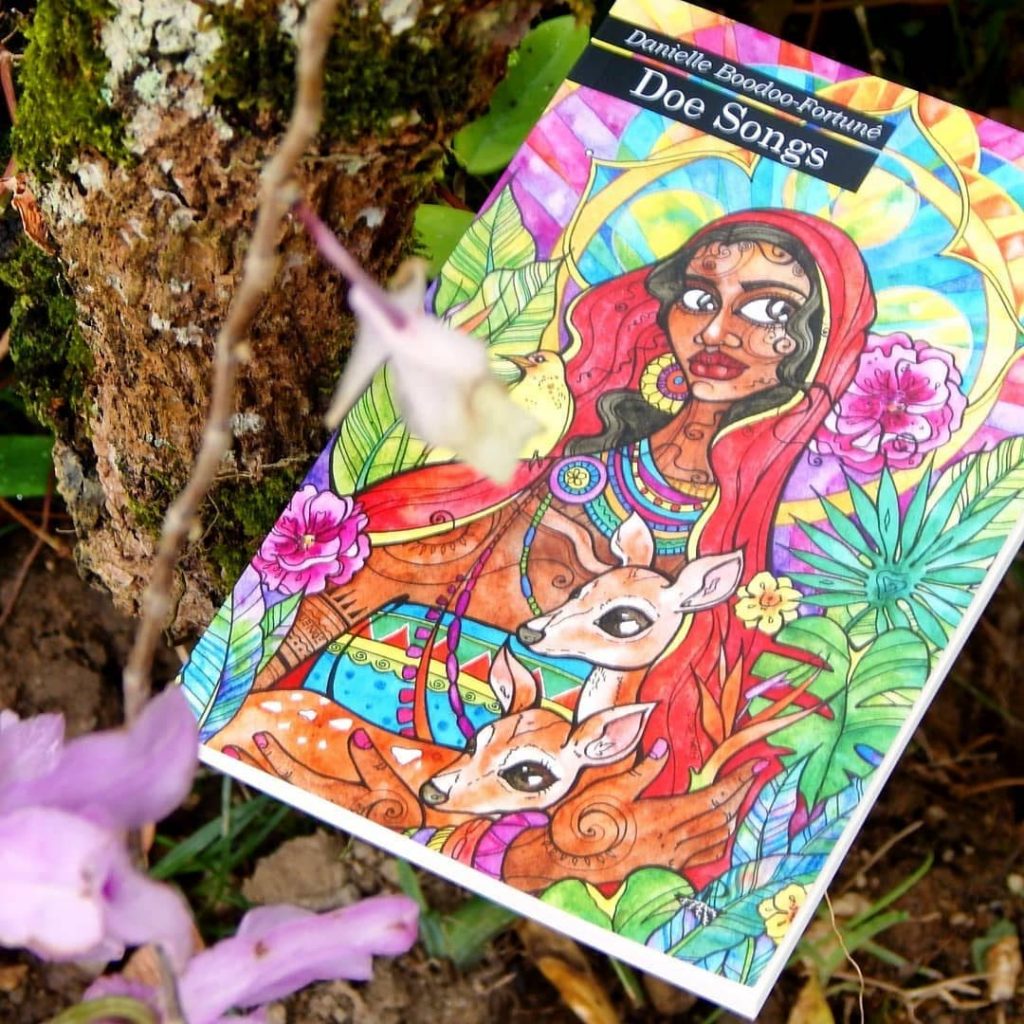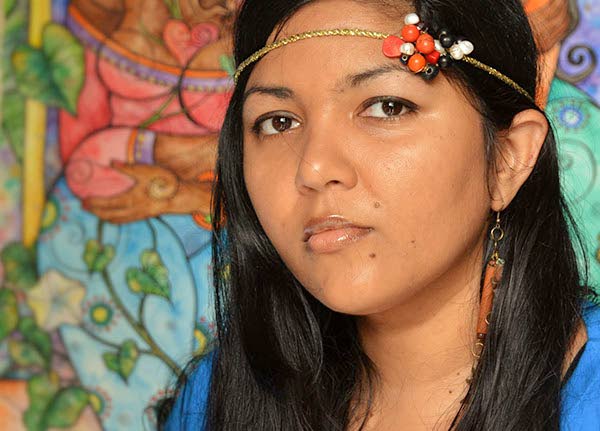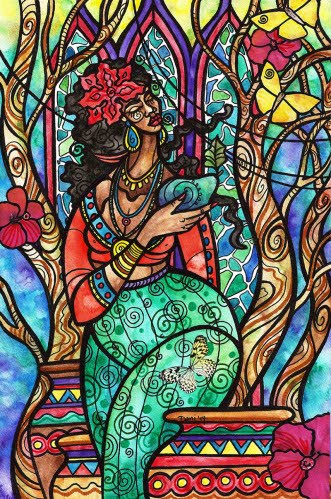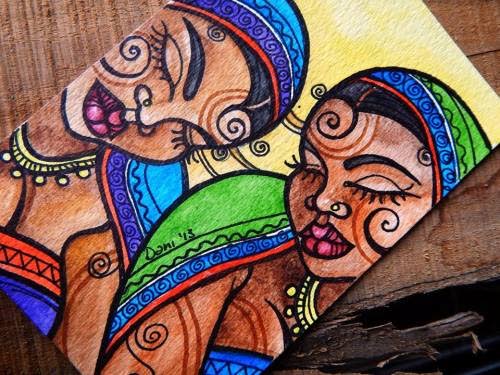Doe Songs

Danielle Boodoo-Fortuné’s Doe Songs (2018), reviewed by JENNIFER RAHIM.
Doe Songs, Danielle Boodoo-Fortuné’s debut collection, is not a book to be read and digested in one sitting. The poems invite rumination and stretch the reader at all levels of heart and imagination – the surest signs that one has encountered a poet of significant power – and Boodoo-Fortuné has only just begun to exercise hers.
The themes are familiar in that they largely belong to the broad canvas of concerns with the labyrinthine world familial relationships, mothers and mothering, daughters and parents, the intricacies of love, the relationship to place, the natural and spirit worlds. Their treatment, however, is far from commonplace. In fact, there is an unforced originality about this poet.
Among the most powerful poems are those that engage family and love. Boodoo-Fortuné does not spare us their difficulties. She shuns romanticism and bravely confronts the sometimes harsh realities of our imperfect human garden. A mature wisdom informs lines that refrain from easy didacticism while remaining soberly engaged with human weakness and the need to garner strategies for healthy flourishing.

There are, for instance, toxic familial pasts and patterns she must overcome to make her own full living possible. She writes, “In my mother’s house, blue as bruise and dry/as tinder, there are rooms I am too tall to enter.” Considering her father, the fisherman’s son, in the masterful poem My Father as a Grouper, she writes of “weight” that “is too much to carry, even underwater.”
At the core of the collection is an intergenerational web of women stories that tell almost parabolically of the damage of dysfunctional loving that leaves a trail of disappointment, grief and brokenness, as in Book Of Nights, A Poem Of The World’s Last Night, the mock Novena For A Wounded Mother and Last Postcard From New Grace, which opens with the sorrowful lines, “The nets drowned my mother’s great heart / long before I learned how to weep.”
The poet, herself married and a new mother to a son, mines the traumatised family histories across entangled generational lines, as if to warn herself against walking those destructive paths, even as she seeks a vital connection.
This collection is a deeply studied reflection on “hurt” that ultimately questions the nature of love. Images of “glass,” “dry bones,” “fire,” “nets” speak doubly of the suffering carried in “buttoned-up hurricane hearts,” and of the unmanageable danger of women whose “love” can be like her great-grandmother, Petra, an “unsheathed claw.”

Foremost in these songs, which are many times laments, is the narrow divide between passion and obsession, surrender and subjugation. In such a world, “love” or its distortions can be a brutal game for women, and men alike.
The poem A Hammer to Love With, for instance, cryptically unravels the harsh but pragmatic maternal legacy bequeathed the poet. It cautions against naïveté and weakness, for “a heart too soft/will fail.” The female relation is portrayed rapaciously dragging home her catch, the hammer “between her bone sharp teeth.” She is as dangerous as she is vulnerable.
Women are not simply victims, though. They can appear as wounded hunters and insatiable lovers. There is, too, a certain kind of beauty and strength in vulnerability which the poet touches in her moving poem Mother in the Morning. Consciously unshackled from domestic work, her mother digs without gloves “not afraid of the damp, dark earth/with its shards of buried glass and crawling creatures,” suggesting a learnt openness to the possibility that life will wound.
The poet’s personal stance, however, is to find in herself the capacity to be vulnerable without being defeated, not clad like the mother-figure in the “colour of hurt.” Power in the context of male-female relations and mothering is interrogated in its many aspects by Boodoo-Fortuné’s complicated, multifarious engagement with the feminine, from which she attempts to draw life lessons.
In this age of growing concern with environmental and ecological destruction, Boodoo-Fortuné is a voice that reminds us of the interconnectedness of the cosmos, connections that are as material as they are spiritual. Hers is sensibility enrapt with place: land, seascapes, and their creatures. All inform the imaginative lens through which she sees and know.
Her tragic but tender doe poems move seamlessly through an engagement with the vulnerability of wildlife to destruction by human beings to the power of nature as a ready teacher as well as its own source of nemesis.

This piece is called The Sisters.
In the poem Dream of My Daughter as A Fawn, for instance, the likeness invoked between daughter and fawn, mother and doe, skilfully navigates the crossroads between dream and reality, animals and humans. The daughter is the fawn, the dream is the reality, so the fawn’s vulnerability and strength are the daughter’s: “See my hooves, mother, she whispers./The beginnings/of my antlers. See how I am fiercely made.”
While in time Boodoo-Fortuné’s concerns will expand and change, I believe what she achieved with theme and form in this first collection of poems will remain the foundation of her work. She tries, as in allegorical story-telling, to move us out of compartmentalised comparative thinking to a fresh engagement with what the image, the nature of things or what is simply there but is often beneath our seeing.
The reader is gently weaned off any tendency to simplistically dichotomise the differences between beings/things. Almost like the way concentrated seeing finally becomes sacramental, she attempts a poetic holding in tension of the fragile and volatile unity or totality of our being in the world. At her best, she achieves a marriage of vision and artistry, one that balances and moves unflinchingly through beauty and threat, tenderness and brutality, vulnerability and strength, brokenness and wholeness.
What she is after, and these poems do not pretend to have arrived, is the human possibility of transcending all that can “undo,” every “weight” that keeps one under. Beauty, tender-ness, fecundity and possibility cohabit with the inevitable arrival of threat.
What the reader can trust with Boodoo-Fortuné is her capacity to meet the page with unflinching honesty and brave perceptiveness. Doe Songs confronts dark histories for the sake of brighter tomorrows with magical lyricism and captivating myth-making. Moreover, the canvases of these “blue” and “bruised” poems are the labour of one who has consciously chosen “only the bright things,” one who ritualistically blows cleansing “smoke” at the past, grateful that “A tree still lives here/somehow.”
* Dr Jennifer Rahim, a former UWI lecturer, is a port and winner of the 2018 OCM Bocas Prize for Caribbean Literature.

Comments
"Doe Songs"